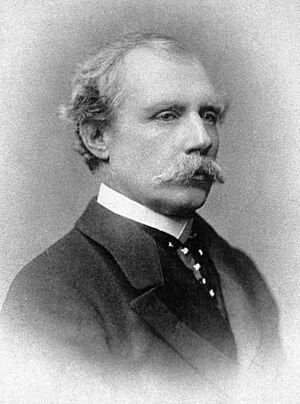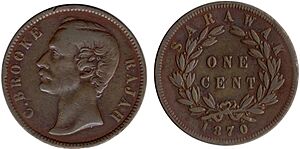Charles Brooke, Rajah of Sarawak facts for kids
Quick facts for kids Charles Brooke |
|||||
|---|---|---|---|---|---|
 |
|||||
| Rajah of Sarawak | |||||
| Reign | 3 August 1868 – 17 May 1917 | ||||
| Predecessor | James Brooke | ||||
| Successor | Charles Vyner Brooke | ||||
| Born | Charles Anthoni Johnson 3 June 1829 Berrow Vicarage, Burnham-on-Sea, Somerset, England |
||||
| Died | 17 May 1917 (aged 87) Cirencester, Gloucestershire, England |
||||
| Burial | St Leonard's Church, Sheepstor on Dartmoor | ||||
| Spouse |
|
||||
| Issue | with Dayang Mastiah:
|
||||
|
|||||
| Dynasty | Brooke Dynasty | ||||
| Father | Francis Johnson | ||||
| Mother | Emma Johnson | ||||
| Military service | |||||
| Allegiance | |||||
| Branch/service | Royal Navy | ||||
| Years of service | 1842–1856 | ||||
| Rank | Lieutenant | ||||
Sir Charles Brooke was the second White Rajah of Sarawak. He was born Charles Anthoni Johnson on June 3, 1829. He ruled Sarawak, a special kingdom in Borneo, from August 3, 1868, until his death on May 17, 1917. Charles took over from his uncle, James Brooke, who was the first Rajah. He helped Sarawak grow and become more modern during his long rule.
Contents
Charles Brooke's Life Story
Early Life and Family
Charles Anthoni Johnson was born in a place called Berrow Vicarage in Burnham, Somerset, England. His parents were Rev. Francis Charles Johnson and Emma Frances Johnson. Emma was the younger sister of James Brooke, who became the first Rajah of Sarawak. Charles had many brothers and sisters.
He went to school at Crewkerne Grammar School. Later, he joined the Royal Navy, which is the British navy.
Becoming Rajah's Successor
In 1852, Charles started working for his uncle, James Brooke, the first Rajah of Sarawak. He took on his uncle's last name, Brooke. He began as a Resident, which is like a local governor, in a place called Lundu.
In 1857, there was a rebellion against Rajah James Brooke. Charles Brooke helped his uncle stop this uprising. He led forces made up of Ibans and local Bidayuh tribes. The rebellion was eventually put down, though many lives were lost. In 1865, James Brooke chose Charles to be the next Rajah.
Family Life
Charles Brooke married Margaret Alice Lili de Windt on October 28, 1869. She became the Ranee of Sarawak on the same day. They had six children together, but only three of them lived past infancy:
- Charles Vyner Brooke, who became the next Rajah of Sarawak (1874–1963)
- Bertram Willes Dayrell Brooke, known as the Tuan Muda (1876–1965)
- Henry Keppel Brooke, known as Tuan Bongsu (1878–1927)
Charles also had an older son named Esca Brooke (1868–1951) from a previous relationship with a Malay woman named Dayang Mastiah. Esca later moved to Canada and took the name Brooke-Daykin.
It is said that Charles Brooke lost an eye in a riding accident. He supposedly replaced it with a false eye that was meant for a stuffed albatross (a large seabird).
Ruling Sarawak
Charles Brooke left the Royal Navy in 1861. He continued the important work his uncle had started in Sarawak. He worked to stop piracy (sea robbery), slavery, and head-hunting. He also encouraged trade and helped Sarawak develop. He expanded the borders of his kingdom when he had the chance.
In 1891, he started the Sarawak Museum, which was the first museum in Borneo. In 1903, Brooke founded a boys' school called the 'Government Lay School'. Here, Malay students could be taught in the Malay language. This school later became SMK Green Road.
By the time Charles Brooke passed away, Britain had made Sarawak a protectorate. This meant Britain would protect Sarawak, but Sarawak still governed itself. Sarawak also had a form of parliamentary government and a railway. Oil had also been found in the region.
All three White Rajahs, including Charles Brooke, are buried in St Leonard's Church in the village of Sheepstor on Dartmoor, England.
Special Awards and Recognition
British Honours
- He was made a Knight Grand Cross of the Order of St Michael and St George (GCMG) in 1888. This is a very high honour.
Animals Named After Him
At least two types of animals found in Borneo were named in honour of Charles Brooke:
- Brooke's Squirrel (Sundasciurus brookei), named by a scientist called Oldfield Thomas.
- Cervus brookei, a type of deer named by Charles Hose in 1893.
Want to Learn More?
- Fort Margherita
- Genealogy Johnson/Brooke


